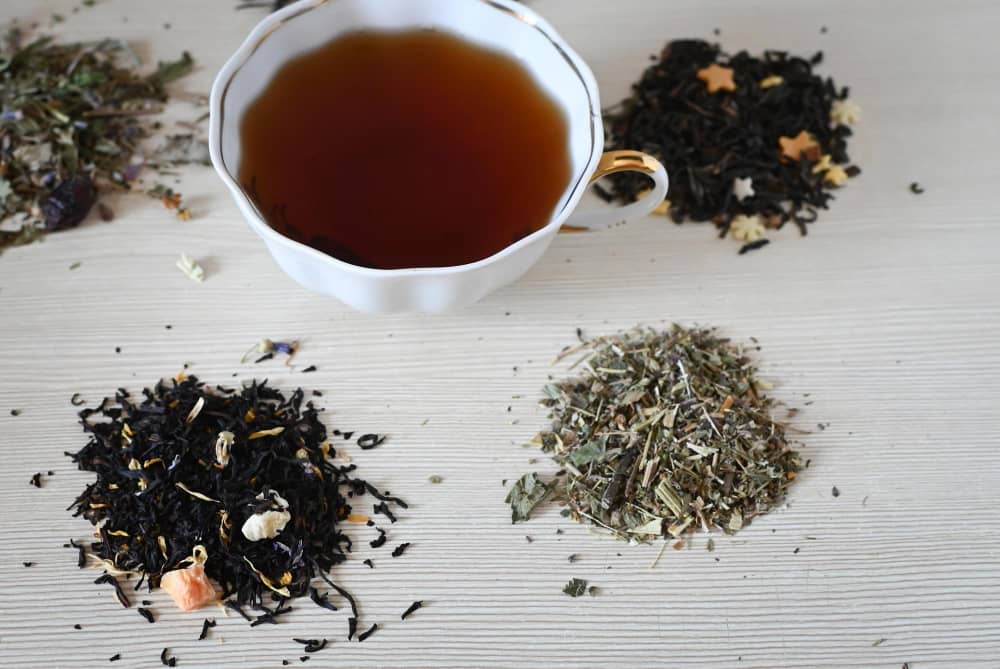Antioxidant-Rich types of tea can have many health benefits for you and has been around for centuries. Tea is one of the most popular beverages in the world and has been consumed for centuries. There are many types of tea that boast high levels of antioxidants. These include green tea, white tea, oolong tea, and black tea. All of these teas come from the Camellia sinensis plant and contain catechins, which are a type of antioxidant. Antioxidants are believed to have many health benefits, including reducing the risk of heart disease and cancer.
“Teatime is a chance to slow down, pull back, and appreciate our surroundings.“
Letitia Baldridge
Antioxidant-rich types of tea can have many health benefits for you and have been around for centuries. Tea is one of the most popular beverages worldwide and has been consumed for centuries. Many types of tea boast high levels of antioxidants.
Types of Tea
Tea is often lauded for its antioxidant content when it comes to healthy beverages. Antioxidants are essential for health because they help to protect cells from damage. Tea is rich in a particular type of antioxidant known as polyphenols, which have numerous health benefits.
Tea is often lauded for its antioxidant content when it comes to healthy beverages. Antioxidants are essential for health because they help to protect cells from damage. Tea boasts an abundance of polyphenols, an exceptional class of antioxidants that bring about a wide range of health advantages. Polyphenols play a crucial role in preventing chronic ailments like heart disease and cancer by effectively scavenging free radicals, detrimental molecules responsible for cellular harm and inflammation.
Of the four types of tea, green tea is the most antioxidant-rich type of tea. This is because it is the least processed type of tea. White tea comes a close second, followed by oolong tea and black tea.
So why should you drink antioxidant-rich tea? There are many reasons. Polyphenols, the type of antioxidant found in tea, have been shown to promote heart health, reduce inflammation, and even improve cognitive function. Drinking antioxidant-rich tea may also help protect against chronic diseases like cancer.
Adding some tea to your daily routine is a great place to start if you want to incorporate more antioxidant-rich types of tea or antioxidant-rich foods into your diet.

Green Tea
Some of the most potent antioxidants found in green tea include catechins, flavonoids, and carotenoids. These antioxidants scavenge harmful toxins and byproducts that can damage cells, including damaging DNA.
In addition to its antioxidant content, green tea is a good source of vitamins A, C, and E and minerals like selenium and manganese.
Green tea has been shown to boost heart health, lower cholesterol levels, improve blood sugar control, and even protect against certain types of cancer.
Green tea is a great place to start if you’re looking to incorporate more antioxidant-rich foods into your diet.
White Tea
Silver Needle is the best choice if you’re looking for the most antioxidant-rich type of white tea. It’s made from only the plant’s buds, making it more expensive than other types of white tea. Different types of white tea include Bai Mudan and Shoumei. Bai Mudan is made from the plant’s leaves and buds, while Shoumei is made from older leaves. Both of these teas are less expensive than Silver Needle, but they are also lower in antioxidants.
Oolong Tea
Originating from China, oolong tea is a type of tea that is made from the leaves of the Camellia sinensis plant. The leaves are typically withered, rolled, and then oxidized before they are dried. Oolong tea can range in color from green to dark brown, and it has a unique flavor often described as being fruity and floral. Studies have shown that oolong tea is rich in antioxidants, which can offer several health benefits. For example, antioxidants can help to protect cells from damage and reduce inflammation.
They may also help to reduce the risk of chronic diseases such as heart disease and cancer. In addition to its antioxidant content, oolong tea is also a good source of caffeine. Caffeine can help to improve mental alertness and focus. It can also promote weight loss by boosting the metabolism and increasing fat burning. So, oolong tea is worth trying if you are looking for a healthy beverage option. Just be sure to check the label to make sure you are getting a quality product.
Black Tea
Black tea is one of the most popular types of tea and one of the most antioxidant-rich. Black tea is made from Camellia sinensis leaves that have been oxidized or air-dried. This process gives black tea its distinctive dark color and flavor. Black tea contains high levels of flavonoids, which are natural antioxidants. Flavonoids scavenge harmful toxins and byproducts that can damage cells, and they have been linked to a reduced risk of some chronic diseases.
Black tea has long been revered for its health benefits. In traditional Chinese medicine, black tea was used to promote digestion and urinary tract health. In India, black tea was used to treat fevers and diarrhea. Today, science is beginning to back up these traditional uses. Research has shown that black tea can help boost immunity, protect against heart disease and stroke, and improve gut health. Black tea is an excellent option if you’re looking for an antioxidant-rich tea to add to your diet. Try drinking it plain or with a splash of milk or lemon.
Pu-erh Tea
Pu-erh tea is a type of fermented dark tea that originates from China. It is usually made from a unique variety of Camellia sinensis plants called Yunnan big-leaf tea. The leaves are typically processed by piling and fermentation, which gives pu-erh tea its distinctive earthy flavor. Pu-erh tea is rich in antioxidants, compounds that can neutralize harmful free radicals in the body. Free radicals are unstable molecules that can damage cells and lead to inflammation.
Studies have shown that pu-erh tea can help protect against heart disease, cancer, and cognitive decline. Pu-erh tea is also a good source of catechins, compounds that have been shown to boost metabolism and promote weight loss. One study showed that people who drank pu-erh tea every day for six weeks lost more weight and body fat than those who didn’t drink tea. Pu-erh tea is best brewed using two grams of leaves per cup of water. Steep for three minutes and enjoy!

Health Benefits of Drinking Tea
There are numerous health benefits associated with drinking tea, especially those rich in antioxidants. Antioxidants are known to help protect cells from damage, and they have been linked with a reduced risk of several chronic diseases, such as cancer and heart disease. Some of the most antioxidant-rich types of tea include green tea, black tea, white tea, and oolong tea. Green tea is made from the unfermented leaves of the Camellia sinensis plant and has high levels of catechins, a type of antioxidant.
Black tea is made from fermented leaves and has higher levels of theaflavins and thearubigins, as well as antioxidants. White tea is made from the youngest leaves of the Camellia sinensis plant and has higher levels of catechins than green tea.
Oolong tea is made from partially fermented leaves and has a unique antioxidant profile, including catechins and theaflavins. There are many health benefits associated with drinking antioxidant-rich teas. These benefits include a reduced risk of cancer, improved heart health, reduced inflammation, and better cognitive function. Antioxidant-rich teas can also help boost the immune system and protect against cellular damage.
Reduced Risk of Cancer
The potential health benefits of tea have been well-documented. Tea is rich in antioxidants, which are linked to reduced cancer risk. A recent study found that tea drinkers had a lower risk of developing cancer than non-tea drinkers. Furthermore, tea has also been shown to boost immune function, improve mental health, and reduce the risk of heart disease.
Protection Against Heart Disease
Heart disease is the leading cause of death worldwide, and antioxidants are known to protect against it. Tea is rich in antioxidants, so drinking tea has been linked with a lower risk of heart disease. There are many different types of tea, and they all contain different amounts of antioxidants.
The most antioxidant-rich type of tea is white tea, made from the young leaves and buds of the Camellia sinensis plant. White tea has higher levels of catechins than other types of tea, which are powerful antioxidants that protect against heart disease. One study found that people who drank three cups of white tea daily had a lower risk of heart disease than those who didn’t drink tea.
Green tea is also high in antioxidants and has been linked with a lower risk of heart disease. Green tea contains catechins, powerful antioxidants that protect against heart disease. One study found that people who drank five cups of green tea daily had a lower risk of dying from heart disease than those who didn’t drink tea.
Black tea is also highly antioxidants but contains less catechins than white tea and green tea. However, black tea has been linked with a lower risk of heart disease. One study found that people who drank three cups of black tea daily had a lower risk of heart disease than those who didn’t drink tea.
So, all types of tea – white, green, and black – can help protect against heart disease. Please choose the best tea type and drink it regularly to enjoy the benefits.
Improved Mental Health
There are many benefits to drinking tea, including improved mental health. Tea is rich in antioxidants, which can help protect your body against cell damage and improve your overall health. Drinking tea has been linked to lower rates of depression and anxiety, and some research suggests that it may also help to improve cognitive function. Tea contains caffeine, which can help to improve alertness and focus, and it also has L-theanine, an amino acid that can help to promote relaxation. Drinking tea can, therefore, allow you to feel more relaxed and less stressed.
Weight Loss
When it comes to weight loss, there are many different approaches that people take. Some people opt for fad diets that promise quick results, while others gradually change their eating habits. However, one weight loss strategy that is often overlooked is drinking tea. Tea is not only a refreshing beverage, but it can also be an excellent tool for weight loss.
This is because tea is rich in antioxidants, which have been shown to boost metabolism and promote fat burning. Studies have shown that drinking green tea can help you lose weight and body fat. So, if you want to slim down, consider adding some of the most antioxidant-rich types of tea to your diet. Green tea, white tea, oolong tea, and black tea are all excellent choices. Not only will they help you lose weight, but they’ll also improve your overall health.
Final Words
Tea is more than just a delicious beverage. It is packed with antioxidants and other health-promoting compounds that can offer significant health benefits. Drinking tea regularly has been linked with reduced risk of cancer, protection against heart disease, improved mental health, and even weight loss. So, if you are looking for a healthy beverage to add to your diet, be sure to give tea a try. There are many different types of tea to choose from, so you will surely find one you enjoy.
Post Disclaimer
The information contained in this post is for general information purposes only. The information is provided as is and while we endeavour to keep the information up to date and correct, we make no representations or warranties of any kind, express or implied, about the completeness, accuracy, reliability, suitability or availability with respect to the website or the information, products, services, or related graphics contained on the post for any purpose.
These statements have not been evaluated by the FDA and are not intended to diagnose, treat, cure or prevent any disease or health condition. If you have specific healthcare concerns or questions about the products displayed, please contact your licensed healthcare professional for advice or answers.


